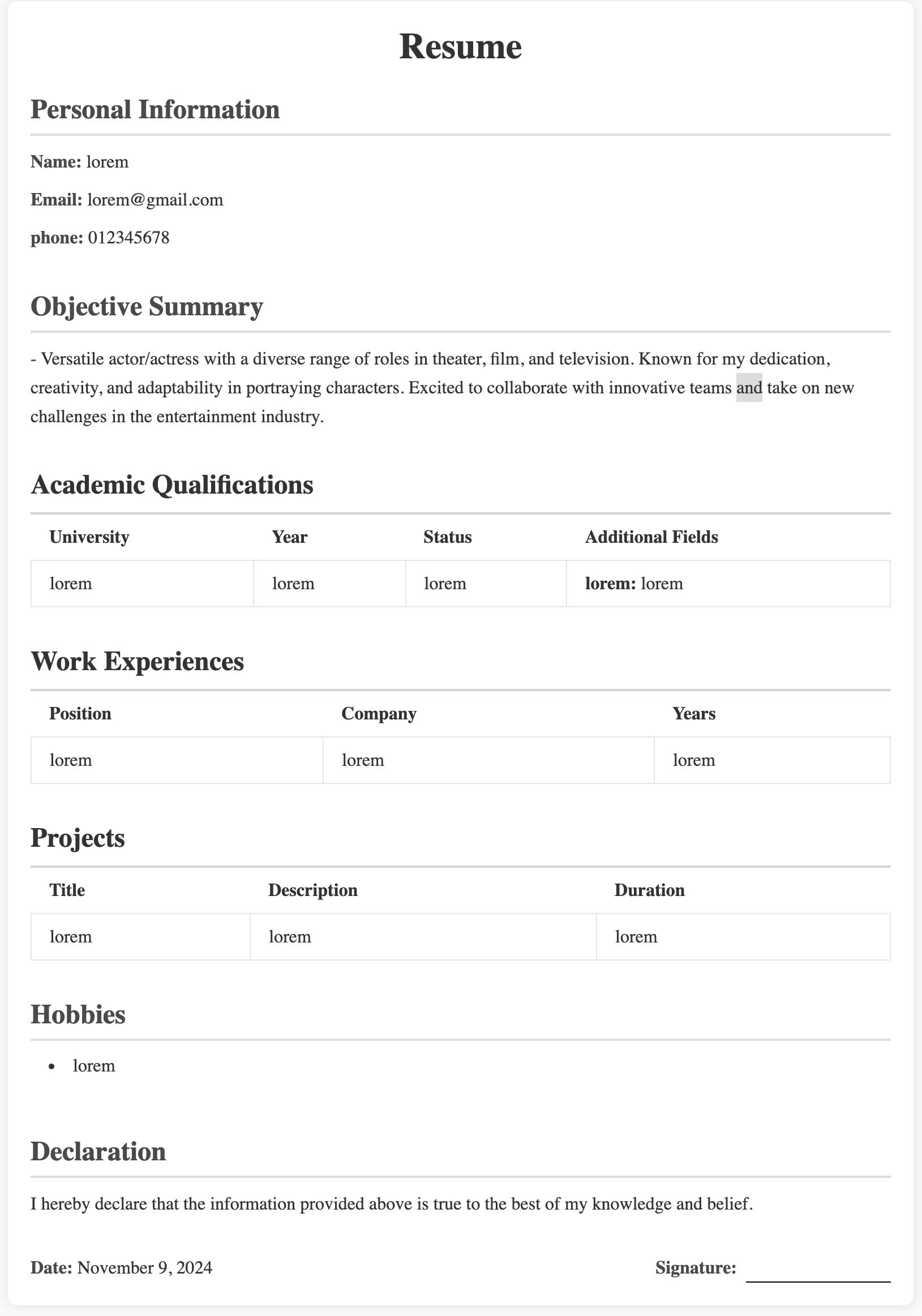Resources/Resume-Guide/Biologist
Biologist CV Guide with Free Resume Template
When writing a biology resume, you can include a list of relevant skills and proficiencies, along with your education, certifications, and experience. Some skills that are important for biology resumes include
1. Start with Contact Information
Include your full name, phone number, professional email, LinkedIn profile, and portfolio (if applicable).
- Example:
Jane Doe
jane.doe@email.com | (123) 456-7890 | LinkedIn.com/in/janedoe | Portfolio: janedoe.bio
2. Write a Professional Summary or Objective
This is a snapshot of your expertise and career goals, tailored to the job.
- Summary Example:
“Detail-oriented biologist with 5+ years of research experience in molecular biology and ecological fieldwork. Skilled in PCR, ELISA, and GIS mapping, with a track record of publishing peer-reviewed articles and leading interdisciplinary teams.” - Objective Example:
“Seeking a role in conservation biology to apply expertise in biodiversity assessment and environmental policy development to protect endangered ecosystems.”
3. Education
List your highest degree first and include relevant details.
- Example:
Master of Science in Ecology and Evolutionary Biology
University of XYZ | May 2022- Thesis: “Impact of Urbanization on Pollinator Diversity.”
4. Research and Work Experience
Focus on accomplishments and skills rather than just listing duties. Use action verbs and quantify where possible.
- Example:
Research Biologist
National Ecology Center | June 2020 – Present- Conducted biodiversity surveys across 10+ protected areas, collecting data on species populations and habitat conditions.Developed models predicting climate change impacts on migratory bird patterns using R.Published findings in Journal of Wildlife Conservation.
GenBioTech Labs | Jan 2019 – May 2020- Performed PCR, gel electrophoresis, and DNA sequencing for genetic studies.
- Improved sample processing efficiency by 20% through protocol optimization.
5. Skills
Organize skills into categories for clarity.
- Lab Techniques: PCR, Western Blot, CRISPR, Spectrophotometry
- Field Skills: GPS Mapping, Species Identification, Habitat Analysis
- Software: R, Python, Excel, ArcGIS
- Transferable Skills: Data Analysis, Report Writing, Team Leadership
6. Certifications and Awards
Include relevant certifications, honors, and recognitions.
- Examples:
- Certified Wildlife Biologist (The Wildlife Society)
- GIS Professional Certification
- Outstanding Graduate Research Award, XYZ University
7. Publications and Presentations (Optional)
Add this section if you have research publications or conference presentations. Use proper citation style.
- Examples:
- Doe, J., & Smith, A. (2023). “Urban Wetlands: A Haven for Migratory Birds.” Journal of Ecology.
- Presented findings on invasive species control at the 2022 Conservation Biology Conference.
8. Volunteer Work or Extracurricular Activities
Showcase your passion for biology-related causes.
- Example:
Volunteer Conservationist
Save the Wetlands Initiative | June 2021 – Dec 2022- Led community workshops on local biodiversity and conservation practices.
9. Tailor for the Job
Incorporate keywords from the job description. Highlight experiences and skills most relevant to the specific role.
10. Proofread
Ensure the resume is error-free and formatted consistently. Use a PDF format when submitting unless otherwise specified.
Would you like a sample template or help tailoring your resume for a specific position?

Recent Categories
- General
- Accountant
- Actor/Actress
- Administrator
- Advertising Executive
- Aerospace Engineer
- Agricultural Engineer
- Air Traffic Controller
- Aircraft Mechanic
- Ambulance Driver
- Animator
- Architect
- Artist
- Astronomer
- Athlete
- Attorney/Lawyer
- Audiologist
- Author
- Baker
- Banker
- Barista
- Bartender
- Biologist
- Biomedical Engineer
- Bookkeeper
- Brand Manager
- Bus Driver
- Business Analyst
- Butcher
- Carpenter
- Chef
- Chemical Engineer
- Chemist
- Chiropractor
- Civil Engineer
- Claims Adjuster
- Clinical Psychologist
- Coach
- Computer Engineer
- Computer Operator
- Copywriter
- Cosmetologist
- Costume Designer
- Court Reporter
- Dancer
- Dental Assistant
- Dentist
- Dermatologist
- Detective
- Dietitian
- Director
- Dispatcher
- DJ
- Doctor
- Economist
- Editor
- Electrician
- EMT
- Engineer
- Environmental Scientist
- Event Planner
- Executive Assistant
- Fashion Designer
- Film Director
- Financial Advisor
- Firefighter
- Fitness Trainer
- Flight Attendant
- Florist
- Forensic Scientist
- Game Developer
- Gardener
- Geologist
- Graphic Designer
- Hair Stylist
- Handyman
- Health Educator
- Home Inspector
- Hotel Manager
- HR Manager
- Illustrator
- Industrial Designer
- Information Security Analyst
- Insurance Agent
- Interior Designer
- Interpreter
- Investment Banker
- IT Manager
- Journalist
- Judge
- Laboratory Technician
- Landscaper
- Librarian
- Linguist
- Loan Officer
- Lobbyist
- Locksmith
- Logistician
- Makeup Artist
- Manager
- Marine Biologist
- Market Research Analyst
- Massage Therapist
- Mathematician
- Mechanic
- Medical Assistant
- Medical Biller
- Medical Coder
- Medical Interpreter
- Medical Transcriptionist
- Meteorologist
- Microbiologist
- Model
- Mortician
- Musician
- Nanny
- Network Administrator
- Nurse
- Nutritionist
- Occupational Therapist
- Office Manager
- Optician
- Optometrist
- Painter
- Paralegal
- Paramedic
- Pediatrician
- Personal Trainer
- Pharmacist
- Phlebotomist
- Photographer-option
- Publisher
- Radiologist
- Real Estate Agent
- Receptionist
- Recreation Worker
- Recruiter
- Registered Nurse
- Reporter
- Research Scientist
- Respiratory Therapist
- Retail Salesperson
- Robotics Engineer
- Sales Manager
- School Counselor
- Scientist
- Secretary
- Security Guard
- Server
- Set Designer
- Social Worker
- Software Developer
- Speech Pathologist
- Statistician
- Stockbroker
- Stylist
- Surgeon
- Surveyor
- System Administrator
- Tax Preparer
- Teacher
- Technical Writer
- Telecommunications Specialist
- Therapist
- Tour Guide
- Translator
- Truck Driver
- Ultrasound Technician
- Urban Planner
- Usher
- Veterinarian
- Video Editor
- Waiter/Waitress
- Web Developer
- Welder
- Writer
- Yoga Instructor